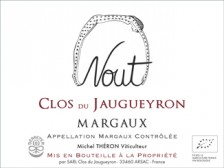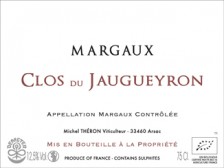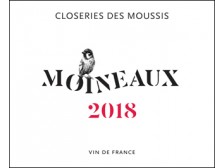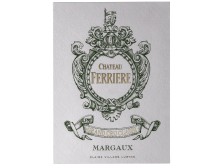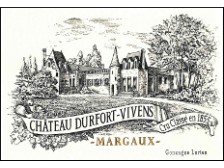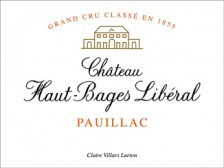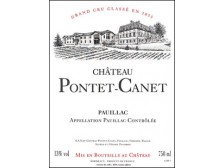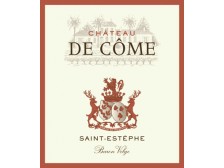Catalog
Other labels exist (Demeter, Biodyvin, Nature et Progrès...). These have more demanding specifications than organic farming but are not recognised by public agencies.
-
Straddling the Margaux and Haut-Médoc appellations, Clos du Jaugueyron is a mini estate (8 ha in total) in the southern Médoc run like a vegetable garden by Mr. and Mrs. Théron. With attention to the smallest detail, they produce true Margaux, as dense and spicy as they are slender. Quoted as "a safe address" by M. Bettane, and as "one of the most interesting properties in the Médoc at the moment" by the Revue du Vin de France.
The "Nout" cuvée, which is more quickly accessible, has a majority of Merlot (55%), while the Grand Vin gives pride of place to Cabernet Sauvignon (65%).
The Nout cuvée was cited among the "Bordeaux of legend" in the Revue du Vin de France (May 2020).More- To keep or to drink:
- Ready to drink
- Apogée:
- 2026-2035
- Organic certification:
- 2012
-
Straddling the Margaux and Haut-Médoc appellations, Clos du Jaugueyron is a mini estate (8 ha in total) in the southern Médoc run like a vegetable garden by Mr. and Mrs. Théron. With attention to the smallest detail, they produce true Margaux, as dense and spicy as they are slender. Quoted as "a safe address" by M. Bettane, and as "one of the most interesting properties in the Médoc at the moment" by the Revue du Vin de France.
The "Nout" cuvée, which is more quickly accessible, has a majority of Merlot (55%), while the Grand Vin gives pride of place to Cabernet Sauvignon (65%).
The Nout cuvée was cited among the "Bordeaux of legend" in the Revue du Vin de France (May 2020).The 2016 vintage of the Grand Vin, "all roundness, smoothness and grace. A Margaux à la bourguignonne", is rated 95/100 by the Revue du Vin de France.
More- To keep or to drink:
- Ready to drink
- Apogée:
- 2023-2031
- Organic certification:
- 2012
-
Straddling the Margaux and Haut-Médoc appellations, Clos du Jaugueyron is a mini estate (8 ha in total) in the southern Médoc run like a vegetable garden by Mr. and Mrs. Théron. With attention to the smallest detail, they produce true Margaux, as dense and spicy as they are slender. Quoted as "a safe address" by M. Bettane, and as "one of the most interesting properties in the Médoc at the moment" by the Revue du Vin de France.
The "Nout" cuvée, which is more quickly accessible, has a majority of Merlot (55%), while the Grand Vin gives pride of place to Cabernet Sauvignon (65%).
The Nout cuvée was cited among the "Bordeaux of legend" in the Revue du Vin de France (May 2020).The 2016 vintage of the Grand Vin, "all roundness, smoothness and grace. A Margaux à la bourguignonne", is rated 95/100 by the Revue du Vin de France.
More- To keep or to drink:
- Ready to drink
- Apogée:
- 2022-2030
- Organic certification:
- 2012
-
Straddling the Margaux and Haut-Médoc appellations, Clos du Jaugueyron is a mini estate (8 ha in total) in the southern Médoc run like a vegetable garden by Mr. and Mrs. Théron. With attention to the smallest detail, they produce true Margaux, as dense and spicy as they are slender. Quoted as "a safe address" by M. Bettane, and as "one of the most interesting properties in the Médoc at the moment" by the Revue du Vin de France.
The "Nout" cuvée, which is more quickly accessible, has a majority of Merlot (55%), while the Grand Vin gives pride of place to Cabernet Sauvignon (65%).More- To keep or to drink:
- Wait 1 to 2 years
- Apogée:
- 2027-2038
- Organic certification:
- 2012
-
Straddling the Margaux and Haut-Médoc appellations, Clos du Jaugueyron is a mini estate (8 ha in total) in the southern Médoc run like a vegetable garden by Mr. and Mrs. Théron. With attention to the smallest detail, they produce true Margaux, as dense and spicy as they are slender. Quoted as "a safe address" by M. Bettane, and as "one of the most interesting properties in the Médoc at the moment" by the Revue du Vin de France.
The "Nout" cuvée, which is more quickly accessible, has a majority of Merlot (55%), while the Grand Vin gives pride of place to Cabernet Sauvignon (65%).More- To keep or to drink:
- Ready to drink
- Apogée:
- 2024-2037
- Organic certification:
- 2012
-
With their Haut-Médoc, Laurence Alias and Pascale Choime, respectively engineer and oenologist, also have a half-hectare in Margaux (Cantenac) pampered like a vegetable garden. It gathers 6 Bordeaux grape varieties (with Petit Verdot, Carménère and Malbec), some of which are more than a century old. Biodynamic cultivation, nothing else in the cellar but the grapes and a little sulfur, aging in 400 liter barrels, everything is done to stay as close as possible to the most delicate and crisp fruit.
Moineaux is the 2018 vintage of the usual cuvée produced in Margaux. Airy and subtly fruity (raspberry juice), it did not receive the approval of the appellation because it is considered atypical: it is consequently labeled as Vin de France.
More- To keep or to drink:
- Ready to drink
- Apogée:
- 2025-2036
- Organic certification:
- 2012
-
A small Margaux classified growth (24 ha), Ferrière is a traditional Margaux, frank and pleasant, moderately powerful but perfectly balanced. Its capacity for ageing is undeniable. Certified organicsince 2015, Ferrière was doubly certified biodynamic in 2018, with the Biodyvin and Demeter labels. Awarded Best Winemaker of the Year 2024 by Revue du Vin de France, Claire Villars-Lurtonet has pushed her Margaux cru to the top. Bravo!
The 2023 vintage in the press:
La Revue du Vin de France (Guide 2026): 94/100 "A bottle that will be perfect in 3 to 4 years. 2023 promises to be softer, of course, but very indulgent and close to a luminous fruit."
More- To keep or to drink:
- Wait 1 to 2 years
- Apogée:
- 2028-2038
- Organic certification:
- 2015
- Potential alcohol:
- 13.2%
- Grape varieties:
- 68 % Cabernet sauvignon, 28 % Merlot, 3,5 % Petit verdot, 0,5 % Cabernet Franc
-
A small Margaux classified growth (24 ha), Ferrière is a traditional Margaux, frank and pleasant, moderately powerful but perfectly balanced. Its capacity for ageing is undeniable. Certified organicsince 2015, Ferrière was doubly certified biodynamic in 2018, with the Biodyvin and Demeter labels. Awarded Best Winemaker of the Year 2024 by Revue du Vin de France, Claire Villars-Lurtonet has pushed her Margaux cru to the top. Bravo!
The 2021 vintage in the press:
La Revue du Vin de France (Guide 2025): 95/100 “Once again, let's salute the elegance and balance of this very digestible 2021. The wine vibrates with delicious fruit and harmony. It's already irresistible."
Vinous (A. Galloni - December 2023): 94/100 “The 2021 Ferrière is a very shy, reticent wine. It has good depth, but all its energy is presently directed inward. Blue fruit, gravel, spice, menthol, licorice and mocha open with a bit of coaxing, wine's flavor profile and overall feel. Yields were just 24 hectoliters-per-hectare.”
J.M Quarin (April 2022): 94/100 “Deep, dark purple color. Intense nose of ripe, fresh fruit. Meticulous on entry, very tasty in the middle, also very pleasant, well-constructed, the wine evolves tasty, towards a long, persistent finish, with a lovely coated tannic relief.”
Bettane + Desseauve (Guide 2026) : 93/100
More- To keep or to drink:
- Ready to drink
- Apogée:
- 2026-2038
- Organic certification:
- 2015
-
A small Margaux classified growth (24 ha), Ferrière is a traditional Margaux, frank and pleasant, moderately powerful but perfectly balanced. Its capacity for ageing is undeniable. Certified organicsince 2015, Ferrière was doubly certified biodynamic in 2018, with the Biodyvin and Demeter labels. Awarded Best Winemaker of the Year 2024 by Revue du Vin de France, Claire Villars-Lurtonet has pushed her Margaux cru to the top. Bravo!
The 2018 vintage in the press:
La Revue du Vin de France (December 2022): 95/100 “Claire Villars-Lurton has pushed her small Margaux cru to new heights in a good decade. Château Ferrière now represents one of the best value for money in the Médoc. Whether 2018 or 2019, these are top-flight wines. We praise their elegance and the brilliance of their fruit, the result of work in the vineyard (biodynamic) and in the cellars.”
Vinous (A. Galloni - March 2021): 94/100 "The 2018 Ferrière is a powerful, tightly wound wine. Inky dark fruit, gravel, cured meats, graphite, smoke and lavender all run through the 2018. Readers will have to be especially patient, as the 2018 needs time to unwind. Yields are down from an average of 45 hectoliters per hectare to just 26, which no doubt contrinutes to the wine's natural intensity. The blend is 68% Cabernet Sauvignon, 25% Merlot, 5% Petit Verdot and 2% Cabernet Franc, in other words, the Cabernet Sauvignon is especially high, a recent trend here because of climate change."
J-M Quarin (April 2021): 93/100 "Dark, intense and beautiful colour. Very aromatic, refined nose with ripe fruit. Full-bodied on the attack, juicy and complete on the palate, the wine develops complex flavours, then stretches out into a juicy, long and noble finish."
More- To keep or to drink:
- Ready to drink
- Apogée:
- 2025-2038
- Organic certification:
- 2015
- Potential alcohol:
- 14.5%
-
A small Margaux classified growth (24 ha), Ferrière is a traditional Margaux, frank and pleasant, moderately powerful but perfectly balanced. Its capacity for ageing is undeniable. Certified organicsince 2015, Ferrière was doubly certified biodynamic in 2018, with the Biodyvin and Demeter labels. Awarded Best Winemaker of the Year 2024 by Revue du Vin de France, Claire Villars-Lurtonet has pushed her Margaux cru to the top. Bravo!
The 2016 vintage in the press:
Vinous (A. Galloni - December 2018): 93+/100 "The 2016 Ferrière is a dense, full-bodied wine that is going to need at least a few years in bottle to shed some of its tannins. Old vines imbue the 2016 with a palpable sense of power and resonance that comes through in the wine's dark, somber personality. The tannins are equally imposing though, so patience is essential. Blackberry, smoke and gravel are some of the notes that build as the 2016 starts to open in the glass."
More- To keep or to drink:
- Ready to drink
- Apogée:
- 2024-2034
- Organic certification:
- 2015
-
In organic conversion from 2013, Durfort-Vivens was one of the very first classified growths in the Médoc to claim and display organic certification from 2016. M. Bettane is one of its most fervent defenders: "the quality/price ratio remains absolutely unique at this level of quality of terroir and work.
More- To keep or to drink:
- Wait 5 to 10 years
- Apogée:
- 2032-2045
- Organic certification:
- 2016
- Potential alcohol:
- 13.7%
- Grape varieties:
- 92% Cabernet franc, 8% Merlot
-
In organic conversion from 2013, Durfort-Vivens was one of the very first classified growths in the Médoc to claim and display organic certification from 2016. M. Bettane is one of its most fervent defenders: "the quality/price ratio remains absolutely unique at this level of quality of terroir and work.
The 2022 vintage in the press:
La Revue du Vin de France (Guide 2026): 95/100 "This beautiful wine exudes notes of fresh flowers on the nose, followed by hints of black fruit. On the palate, we find this lovely complexity, with a very elegant silkiness and lots of charm. We praise its admirable finesse and delicate tannins."
Vinous (A. Galloni - January 2025): 96/100 "The 2022 Durfort-Vivens is a heady, explosive wine. Ample and creamy, the 2022 is seriously impressive. The blend is 84% Cabernet Sauvignon and 16% Merlot, a bit more Merlot than normal. That seems to have filled out the mid-palate, adding a level of juiciness that is quite complementary to the wine's underlying structure. Inky dark fruit, new leather, menthol, licorice and lavender build into a finish that is both opulent and virile. Ageing was 16 months, 70% in new oak and 30% in amphora."
Bettane + Desseauve (Guide 2026) : 95/100
More- To keep or to drink:
- Wait 3 to 5 years
- Apogée:
- 2030-2045
- Organic certification:
- 2016
-
In organic conversion from 2013, Durfort-Vivens was one of the very first classified growths in the Médoc to claim and display organic certification from 2016. M. Bettane is one of its most fervent defenders: "the quality/price ratio remains absolutely unique at this level of quality of terroir and work.
The 2021 vintage in the press:
La Revue du Vin de France (Guide 2025): 94/100 “The great 2021 wine is heavily marked by Cabernet Sauvignon (97%). It is therefore logically rather straight and taut, but with plenty of breed and definition, with notes of red fruit, licorice and spices.”
Vinous (A. Galloni - December 2023): 95/100 “The Durfort-Vivens 2021 was magnificent, rich, dynamic and super-expressive. Above all, the 2021 is perfectly balanced. Black fruit, lavender, licorice, leather and clove burst from the glass. Today the 2021 is an infant. It needs time to shed some of its considerable tannin and for the acids to soften, although that might not ever fully happen.”
Bettane + Desseauve (Guide 2026) : 94/100
More- To keep or to drink:
- Ready to drink
- Apogée:
- 2026-2038
- Organic certification:
- 2016
-
In organic conversion from 2013, Durfort-Vivens was one of the very first classified growths in the Médoc to claim and display organic certification from 2016. M. Bettane is one of its most fervent defenders: "the quality/price ratio remains absolutely unique at this level of quality of terroir and work.
The 2019 vintage in the press:
Bettane et Desseauve (Guide 2024): 99/100
Vinous (N. Martin - September 2021): 93/100 “The 2019 Durfort-Vivens was matured in two-thirds new oak barrels and one-third in amphore. Plush on the nose with blueberry and violet scents, this is Margaux in style though much tighter than I anticipated. The palate is medium-bodied with supple tannins, fine delineation and poise. It's pretty delineated towards the finish that shows more mineralité than previous vintages. There is an appealing linearity here, a trait that Gonzague Lurton seeks in this wines. Excellent.”
More- To keep or to drink:
- Ready to drink
- Apogée:
- 2025-2038
- Organic certification:
- 2016
-
In organic conversion from 2013, Durfort-Vivens was one of the very first classified growths in the Médoc to claim and display organic certification from 2016. M. Bettane is one of its most fervent defenders: "the quality/price ratio remains absolutely unique at this level of quality of terroir and work.
The 2016 vintage in the press:
Vinous (A. Galloni - December 2018): 93/100 "The 2016 Durfort-Vivens is gorgeous. Cabernet Sauvignon aromatics and structure play off the natural intensity of the year beautifully. Blackberry, grilled herbs, licorice, leather and crème de cassis are all vividly sketched in this layered, expressive Margaux. Readers should expect a dark, exotic Margaux that stands a bit apart from the norm for the appellation."
More- To keep or to drink:
- Ready to drink
- Apogée:
- 2024-2040
- Organic certification:
- 2016
-
Since 2010, Claire Villars (also at Ferrière and La Gurgue), puts back in the saddle Haut-Bages Liberal. With a qualitative terroir (adjacent to Latour), this certified organic wine since 2019 has become, for a reasonable price, the good deal of Pauillac.
More- To keep or to drink:
- Wait 1 to 2 years
- Apogée:
- 2027-2038
- Organic certification:
- 2019
-
Since 2010, Claire Villars (also at Ferrière and La Gurgue), puts back in the saddle Haut-Bages Liberal. With a qualitative terroir (adjacent to Latour), this certified organic wine since 2019 has become, for a reasonable price, the good deal of Pauillac.
The 2022 vintage in the press:
La Revue du Vin de France (Guide 2026): 95/100 "This great wine improves year after year. It has now reached a nice cruising speed with beautiful fullness. The tannins are very racy, finely coated and carry energetic fruit. It is already a pleasure to drink."
Vinous (A. Galloni - January 2025): 97/100 "The 2022 Haut-Bages Libéral is huge and explosive right out of the gate. A rush of dark red cherry/plum fruit, rose petal, blood orange, incense, licorice and mocha saturates the palate. Saline notes extend the mid-palate and finish effortlessly. This is one of the most exuberant, ample wines I have tasted from Claire Villars-Lurton. I would give the 2022 a number of years in bottle to shed some baby fat. Today, it tastes almost like a barrel sample! The purity and primary intensity of the fruit is remarkable. The Haut-Bages Libéral was raised in a combination of 40% new oak, 40% once-used barrels and 20% a mix of concrete and amphora. This is one of under-the-radar gems of 2022."
Bettane + Desseauve (Guide 2026) : 94/100
More- To keep or to drink:
- Wait 1 to 2 years
- Apogée:
- 2027-2040
- Organic certification:
- 2019
-
Since 2010, Claire Villars (also at Ferrière and La Gurgue), puts back in the saddle Haut-Bages Liberal. With a qualitative terroir (adjacent to Latour), this certified organic wine since 2019 has become, for a reasonable price, the good deal of Pauillac.
The 2020 vintage in the press:
La Revue du Vin de France (September 2023): 95/100 “The vintage is in full progress, with a well-balanced wine in 2020. There's a chalky texture on the palate, an expression of the chalky soils. The wine is full-bodied, sapid, with fresh tannins that lengthen a clean finish.”
Vinous (A. Galloni - December 2022): 96/100 "The 2020 Haut-Bages Libéral is exceptionnally beautiful and vivid. Hard candy, kirsh, rose petal, cinnamon and blood orange are some of the many notes that race across the palate. A wine of magnificent purity and silkness, the Haut-Bages Libéral is simply captivating in its intensity. Bright acids punctuate the articulate, persistent finis. Magnificent."
More- To keep or to drink:
- Wait 1 to 2 years
- Apogée:
- 2028-2040
- Organic certification:
- 2019
-
Since 2010, Claire Villars (also at Ferrière and La Gurgue), puts back in the saddle Haut-Bages Liberal. With a qualitative terroir (adjacent to Latour), this certified organic wine since 2019 has become, for a reasonable price, the good deal of Pauillac.
The 2019 vintage in the press:
Bettane et Desseauve (Guide 2024): 94/100
La Revue du Vin de France (September 2022): 95/100 “Following in the footsteps of its Ferrière sibling, the cru gains in refinement and depth. 2019 marks a turning point that propels it into another category. Notes of licorice, white pepper, superb softness of tannins: it's irresistible".
Vinous (A. Galloni - january 2022): 94+/100 "The 2019 Haut-Bages Libéral is a gorgeous wine from Claire Lurton, even if it has closed down a bit post-bottling. Deep and translucent in feel, the 2019 gradually reveals hints of crushed red berry fruit, mint, spice, rose petal and aromatic presence. All the 2019 needs is a few years to fully come together."
More- To keep or to drink:
- Ready to drink
- Apogée:
- 2026-2036
- Organic certification:
- 2019
-
Contiguous to Mouton-Rothschild, Pontet-Canet is in good vintages the very type of great Pauillac, straight and racy. The first of the Grands Crus Classés to be certified "organic" (in 2010), Pontet-Canet has been at the top of the Médoc since 2000.
The 2021 vintage in the press:
La Revue du Vin de France (Guide 2025): 96/100 “The 2021 confirms its greatness! The wine offers absolutely magnificent refinement and subtlety. Freshly fruited, it unfolds on the palate with great suavity and silkiness. The substance is superb, the fruit is poised and the tannins are lacy. One of the most charming wines of the vintage”.
Vinous (N.Martin - November 2023): 93/100 “The 2021 Pontet Canet, which coontains a little more Petit Verdot than usual, was bottled in july. It has a very attractive bouquet with pure black fruit, cedar and light iris flower scents. It is not powerful, yet there is elegance here. The palate is medium-bodied with fine tannins and a crisp line of acidity. Just a hint of mocha lurks in the background, but there is a satisfying, almost citric freshness toward the finish.”
Bettane + Desseauve (Guide 2026) : 96/100
More- To keep or to drink:
- Wait 1 to 2 years
- Apogée:
- 2028-2042
- Organic certification:
- 2010
-
Contiguous to Mouton-Rothschild, Pontet-Canet is in good vintages the very type of great Pauillac, straight and racy. The first of the Grands Crus Classés to be certified "organic" (in 2010), Pontet-Canet has been at the top of the Médoc since 2000.
The 2017 vintage in the press:
La Revue du Vin de France (Guide 2021): 97/100 “In a style reminiscent of the great Burgundy wines, 2017 is also a textured wine, with a touch of powder and a very fine grain. Long and slender, but so persistent.”
Vinous (Antonio Galloni - March 2020): 95/100 “A gorgeous, alluring Pauillac, the 2017 Pontet-Canet is racy and exceptionally polished, with floral top notes that bring out the natural brightness of the red-toned fruit. Super-silky tannins add to the wine's immediacy and sheer allure.”
More- To keep or to drink:
- Ready to drink
- Apogée:
- 2025-2038
- Organic certification:
- 2010
- Potential alcohol:
- 13%
-
Contiguous to Mouton-Rothschild, Pontet-Canet is in good vintages the very type of great Pauillac, straight and racy. The first of the Grands Crus Classés to be certified "organic" (in 2010), Pontet-Canet has been at the top of the Médoc since 2000.
The 2015 vintage in the press:
J-M Quarin (September 2021): 94/100 “Double decanted. Dark, intense, slightly evolved color. Very aromatic nose, with ripe, suave fruit. Creamy touch. Tender, tasty, amiable palate, but lacks flight in the mid-palate. Lovely finish, with coated tannins and a flavour somewhat stripped by the double decanting”.
Vinous (N. Martin - February 2025): 93/100 "The 2015 Pontet Canet has a lovely bouquet with mixture of red and black fruit, cedar and subtle tobacco scents. The palate is medium-bodied with fleshy ripe tannins, smooth texture and a sheen of classy new oak with a dab of spice that enlivens the finish. The 2015 is primal for being ten years old-this one I would keep cellared."
More- To keep or to drink:
- Ready to drink
- Apogée:
- 2024-2045
- Organic certification:
- 2010
- Potential alcohol:
- 13.5%
-
Contiguous to Mouton-Rothschild, Pontet-Canet is in good vintages the very type of great Pauillac, straight and racy. The first of the Grands Crus Classés to be certified "organic" (in 2010), Pontet-Canet has been at the top of the Médoc since 2000.
The 2012 vintage in the press:
La Revue du Vin de France (December 2021): 93/100 “The palate is velvety, sitting on half-powered matter, but the heart of the mouth is harmonious. The tannins are well integrated and the whole seduces with its elegant, silky texture. A very pleasant 2012."
More- To keep or to drink:
- Ready to drink
- Apogée:
- 2022-2035
- Organic certification:
- 2010
-
Contiguous to Mouton-Rothschild, Pontet-Canet is in good vintages the very type of great Pauillac, straight and racy. The first of the Grands Crus Classés to be certified "organic" (in 2010), Pontet-Canet has been at the top of the Médoc since 2000.
The 2011 vintage in the press:
J-M Quarin (November 2021): 95/100 "Dark colour, normal intensity and well developed. Intense and refined nose, with ripe, smooth and subtle fruitiness. Delicate on the palate, with flavour, fruit and, from the mid-palate onwards, a meticulous tightening of the texture. Beautifully long and deep finish, without any harshness. Very good."
More- To keep or to drink:
- Ready to drink
- Apogée:
- 2022-2033
- Organic certification:
- 2010
- Potential alcohol:
- 13.5%
-
Contiguous to Mouton-Rothschild, Pontet-Canet is in good vintages the very type of great Pauillac, straight and racy. The first of the Grands Crus Classés to be certified "organic" (in 2010), Pontet-Canet has been at the top of the Médoc since 2000.
The 2010 vintage in the press:
La Revue du Vin de France (December 2021): 96/100 “The wine shows a beautiful richness managed by a framework of quality tannins that stretch the palate and give it relief. This is a serious wine, still fleshy, with many years ahead of it."
Vinous (N. Martin - February 2020): 92/100 "The 2010 Pontet-Canet is noticeably deep in colour compared to its peers. This is unusually ripe and sweet on the nose, more red than black fruit, maybe a little jammy and confit-like. I would never guess this was a 2010 Left Bank. The palate is medium-bodied with a fleshy mouthfeel, plenty of graphite tinged red fruit. Approachable in style and sensually fulfilling, it just lacks a bit of grip backbone on the finish. I have fonder memories of previous bottles but I could not identify any specific fault."
More- To keep or to drink:
- Ready to drink
- Apogée:
- 2025-2040
- Organic certification:
- 2010
- Potential alcohol:
- 14.5%
-
Contiguous to Mouton-Rothschild, Pontet-Canet is in good vintages the very type of great Pauillac, straight and racy. The first of the Grands Crus Classés to be certified "organic" (in 2010), Pontet-Canet has been at the top of the Médoc since 2000.
The 2010 vintage in the press:
La Revue du Vin de France (December 2021): 96/100 “The wine shows a beautiful richness managed by a framework of quality tannins that stretch the palate and give it relief. This is a serious wine, still fleshy, with many years ahead of it."
More- To keep or to drink:
- Wait 1 to 2 years
- Apogée:
- 2028-2050
- Organic certification:
- 2010
- Potential alcohol:
- 14.5%
-
Contiguous to Mouton-Rothschild, Pontet-Canet is in good vintages the very type of great Pauillac, straight and racy. The first of the Grands Crus Classés to be certified "organic" (in 2010), Pontet-Canet has been at the top of the Médoc since 2000.
The 2008 vintage in the press:
Vinous (N. Martin - February 2020): 92/100 "A meeting by chance with the 2008 Pontet-Canet prior to a small tasting of South African wines reminded me what a lovely wine this is. There is plenty of black fruit on the nose laced with graphite. The cedar component is less prominent than the previous bottled tasting. The palate is medium-bodied, a little drier and more austere than recent vintages, yet clearly well balanced with a surfeit of freshness on the slightly herbaceous finish."
More- To keep or to drink:
- Ready to drink
- Apogée:
- 2020-2030
- Organic certification:
- 2010
- Potential alcohol:
- 13%
-
Very rare are the crus of the north of the Médoc to have launched out for the moment in the organic conversion because of a stronger hygrometry than everywhere else in the Gironde. De Côme, a Petit Cru Bourgeois (superior) of 7 ha, has become after 7 years of efforts (and the loss of 2/3 of the 2018 harvest) the first growth of Saint-Estèphe certified organic, in a supple, fine and silky version of the appellation.
More- To keep or to drink:
- Ready to drink
- Apogée:
- 2026-2038
- Organic certification:
- 2018
- Potential alcohol:
- 13.5%
-
Very rare are the crus of the north of the Médoc to have launched out for the moment in the organic conversion because of a stronger hygrometry than everywhere else in the Gironde. De Côme, a Petit Cru Bourgeois (superior) of 7 ha, has become after 7 years of efforts (and the loss of 2/3 of the 2018 harvest) the first growth of Saint-Estèphe certified organic, in a supple, fine and silky version of the appellation.
More- To keep or to drink:
- Wait 1 to 2 years
- Apogée:
- 2027-2037
- Organic certification:
- 2018
-
Very rare are the crus of the north of the Médoc to have launched out for the moment in the organic conversion because of a stronger hygrometry than everywhere else in the Gironde. De Côme, a Petit Cru Bourgeois (superior) of 7 ha, has become after 7 years of efforts (and the loss of 2/3 of the 2018 harvest) the first growth of Saint-Estèphe certified organic, in a supple, fine and silky version of the appellation.
More- To keep or to drink:
- Ready to drink
- Apogée:
- 2023-2032
- Organic certification:
- 2018


